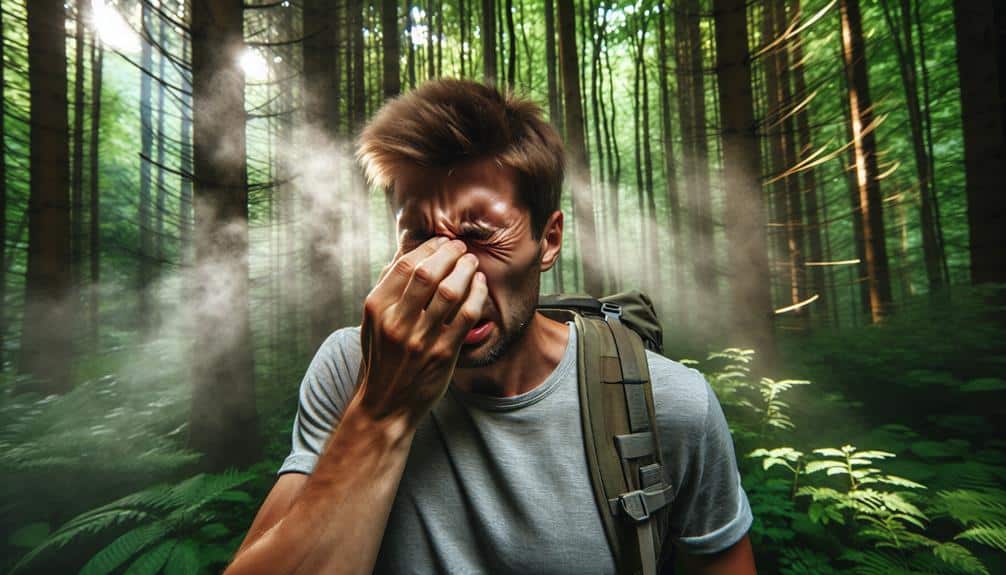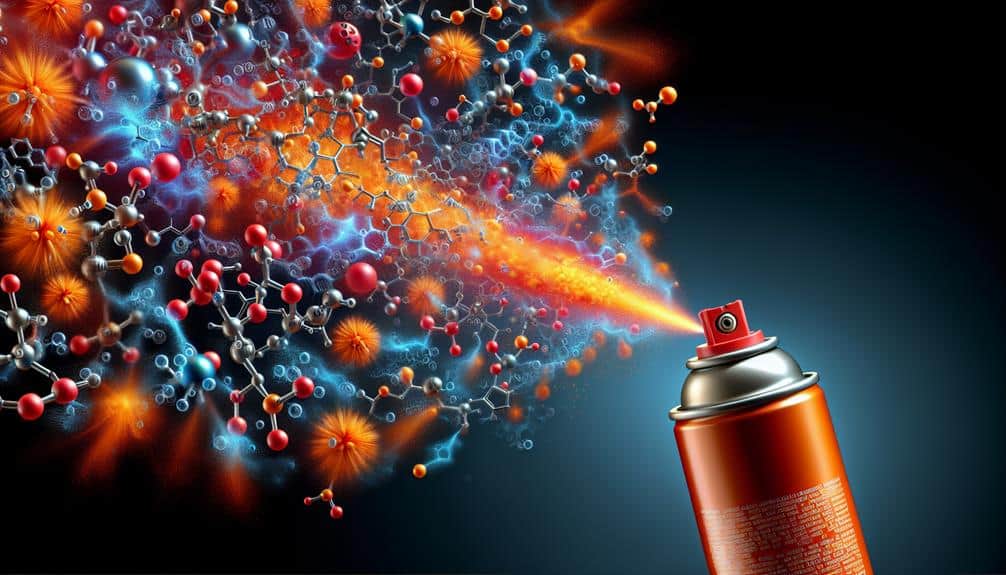
free shipping on orders over $25
We’re having a sale on all our products. Enter your email below to be notified about future sales.


We’re having a sale on all our products. Enter your email below to be notified about future sales.


When you use bear spray on a person, you’re basically blasting them with a whopping 3 million Scoville heat units, which is no joke! This fiery burst causes severe pain, temporary blindness, difficulty breathing, and a burning sensation that’s second to none. Imagine your face on fire and your lungs feeling the same—yikes! Long-term, it can even lead to lasting eye damage and respiratory issues. It’s way more potent than regular pepper spray, so trust me, it’s not something you want to mess with lightly. Use it inappropriately, and you might find yourself in a legal pickle. Wondering what else could happen? Keep on exploring!

Containing 1-2% capsaicin and related capsaicinoids, bear spray is incredibly potent and effective. You might think of capsaicin as just the stuff that makes chili peppers spicy, but in bear spray, it’s a whole new beast. This chemical composition packs a serious punch, designed to ward off the largest of predators.
But what happens when it’s used on a person? Bear spray’s potency can cause severe reactions. Just a whiff can lead to temporary loss of sight, leaving you blinking furiously and wondering what hit you. Eye damage isn’t just a fleeting issue; if sprayed at close range, it can become irreversible. Your nose doesn’t get off easy either—expect nasal congestion that’ll make you wish you’d brought tissues.
Breathing difficulties are another delightful side effect. Those with respiratory conditions might experience bronchospasms or wheezing, turning a bad situation worse. The chemical composition of bear spray makes sure it’s not just a minor inconvenience; it’s a formidable deterrent.
When you encounter bear spray, expect immediate and intense health effects, especially when it comes to breathing and skin reactions.
Breathing can become a struggle, as the spray induces severe coughing, sneezing, and a burning sensation in your throat, almost like inhaling a chili pepper cloud.
Meanwhile, your skin won’t be spared, reacting with a fiery irritation and discomfort that might make you feel like you’ve just rolled in hot sandpaper.
Exposure to bear spray almost always leads to immediate breathing difficulties due to the intense irritation it causes in the respiratory system. When you’re hit with bear spray, the capsaicin—a natural compound found in chili peppers—irritates your respiratory system, causing swelling and inflammation. This can result in temporary nasal congestion and make breathing feel like you’re trying to suck air through a straw.
You might experience severe respiratory distress, with symptoms like wheezing, coughing, and a sensation of choking. Imagine inhaling a cloud of pepper dust; that’s what it feels like. The inhalation of bear spray can leave you gasping for breath, struggling with shortness of breath as your lungs react to the chemical assault. Even a deep breath feels impossible, as if your lungs are suddenly working against you.
Bear spray is designed to stop a charging bear, so it’s no wonder a human would experience intense breathing difficulties. The immediate effects can be alarming, and the discomfort is hard to shake off quickly.
Aside from causing breathing difficulties, bear spray also wreaks havoc on your skin, resulting in immediate irritation and pain. When it hits your skin, you’re in for a rough ride. The reactions are swift and brutal, often leaving you desperate for relief. Here’s what typically happens:
Decontamination is crucial to mitigate these effects. Washing the area thoroughly with soap and water can help, but the discomfort might linger for hours. In severe cases, you might even experience blistering.
In short, bear spray on skin is a recipe for intense suffering.
Long-term health risks from bear spray exposure can include irreversible eye damage and potential respiratory issues for those with pre-existing conditions. When you’re trekking through bear country, carrying bear spray seems like a no-brainer for self-defense.
However, you should know that bear spray isn’t just a stronger version of pepper sprays; its capsaicin content can be up to 3 million Scoville heat units, making it notably more potent. The high capsaicin concentration means that, at close range, bear spray can cause severe eye damage, sometimes even irreversible.
If you have respiratory conditions like asthma, exposure might lead to bronchospasms or wheezing—definitely not something you want when you’re supposed to be enjoying the great outdoors. The EPA regulates bear spray as a pesticide, ensuring it meets quality and safety standards, but that doesn’t mean it’s harmless.
While incidents involving humans are rare, it’s important to handle bear spray with caution. Think of it as handling a hot chili pepper—except this one can incapacitate a bear. So, if you’re venturing into bear country, be prepared, respect the power of this self-defense product, and always follow safety guidelines to minimize long-term health risks.
When comparing bear spray to pepper spray, you’ll find that bear spray is significantly more potent and designed to cover a larger area from a greater distance. This makes it particularly effective in deterring large animals like bears.
Here are some key differences you should know:
In contrast, pepper sprays don’t have this specific regulation, leading to variability in their effectiveness.
Research shows that bear spray has protected people from serious injury or death more than 90% of the time, highlighting its superior effectiveness.

When you use bear spray on a person, you’re stepping into a legal minefield, where criminal charges, self-defense justifications, and civil liability concerns all come into play.
Imagine explaining to a judge why you thought a 10-foot bear deterrent was your best option against a human—it’s not exactly a slam dunk self-defense claim! Depending on your jurisdiction, you might face serious consequences, so think twice before turning your backyard into a bear-free zone, even if your intruder is more ‘Goldilocks’ than grizzly.
Using bear spray on a person can quickly lead to criminal charges, especially if the act isn’t justified under self-defense laws. When you use bear spray on a human, you’re treading through a legal minefield with potential repercussions.
Let’s break it down:
Understanding self-defense laws and the boundaries of justifiable force is essential. Otherwise, your attempt to fend off a threat might land you in hot water, legally speaking. So, think twice before reaching for that can of bear spray!
In situations where you believe you’re in imminent danger, using bear spray as a form of self-defense can be legally justifiable, but it requires careful consideration of the circumstances. Self-defense laws generally demand that you have a reasonable belief of imminent danger to justify the use of force, including bear spray.
Think of it as a pepper spray on steroids, but for people! The severity of the threat and the proximity of the attacker will greatly impact your legal justification.
Bear spray is considered a non-lethal alternative, meaning it’s usually seen as less extreme than, say, using a baseball bat. However, the force used must be proportional to the threat faced. If someone is coming at you with just harsh words, bear spray mightn’t be the right call. But, if you’re being physically threatened, it could be a different story.
Always remember, using bear spray on people has legal implications, and consulting legal experts or authorities about your specific situation can provide essential guidance. The goal is to protect yourself while staying on the right side of the law, ensuring your self-defense claims hold up under scrutiny.
Deploying bear spray on a person can often lead to significant civil liability concerns. When you use bear spray on a human intruder, several legal and ethical implications come into play.
To navigate these complexities, consider the following points:
In light of these points, consulting legal experts is essential. They can help you understand the potential civil liability and make sure that your actions align with legal standards.
After all, you don’t want your self-defense to backfire in a courtroom!
If someone gets sprayed with bear spray, immediately move them to fresh air and away from the source. Start by rinsing their eyes with clean water for at least 15 minutes, as bear spray, like other pepper sprays, can cause significant irritation. These pepper sprays dispense in a fog, making it easy for particles to enter the eyes, nose, and mouth. Use Bear Spray as a wildlife deterrent, but know that it’s far from pleasant for humans.
Next, encourage the affected person to breathe slowly and deeply. Bear deterrents like bear sprays have around 2% to 3% capsaicin, the active ingredient, which can lead to nasal congestion and respiratory discomfort. If they have pre-existing respiratory conditions, they might experience bronchospasms or wheezing, so keep a close eye on them.
Here’s a quick table for reference:
| Action | Why | Duration |
|---|---|---|
| Move to fresh air | Reduces inhalation of particles | Immediate |
| Rinse eyes with water | Removes irritants from eyes | 15 minutes |
| Breathe deeply | Reduces anxiety, aids in recovery | As needed |
| Monitor for symptoms | Watch for severe reactions | Up to 45 minutes |

To prevent accidental misuse of bear spray on humans, always make sure you’re familiar with its proper handling and usage. Bear spray, unlike typical pepper sprays, is designed specifically as a bear deterrent and should be used with caution. Knowing the bear spray’s effectiveness and range is important for bear spray safety and prevention.
Consider these tips to avoid bear spray misuse:
If you use bear spray on a person, it can cause intense pain, temporary blindness, and breathing issues. In self-defense scenarios or accidental exposure, follow decontamination procedures. Misuse consequences include legal implications and health risks.
When bear spray contacts your skin, it triggers a chemical reaction due to capsaicin exposure, causing severe skin irritation and an inflammatory response. The dermatological effects include acute dermatitis, pain response, sensory impact, and skin absorption.
Yes, bear spray is stronger than human spray. Its higher potency and different spray ingredients are designed for bear behavior deterrence. Legal regulations and safety concerns make it unsuitable for human defense tactics due to environmental impact and human tolerance.
Mace can cause intense eye pain, temporary blindness, and breathing issues. In self-defense scenarios, proper usage and safety precautions are essential. Accidental exposure needs first aid. Know chemical components and spray duration, and follow storage guidelines to avoid legal consequences.
Para Bellum Defense
133 Palm Drive
Winter Haven, FL 33880
Telephone: 585-284-6669

3 Responses